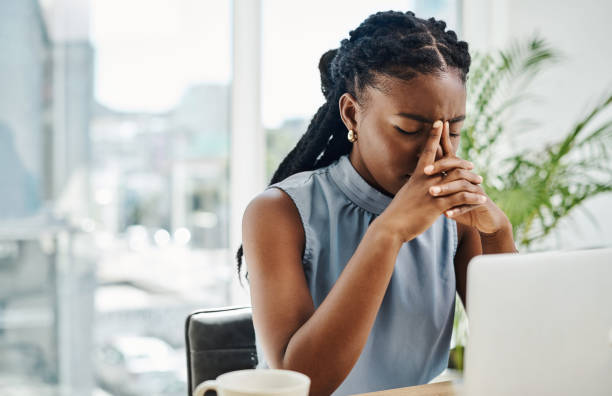5 Tools to Manage your Symptom
When you think of depression, you probably think of lying in bed all day; all energy zapped from your body. Anxiety probably makes you think of nervous movements and erratic thoughts and behaviors. These paint two very different pictures. So how is it that depression and anxiety are so likely and common to exist together? The truth is that they are often manifestations and/or symptoms of one another. The stress of anxiety is fatiguing and depressing. The struggle to achieve our tasks in a depressive state creates anxiety about what we are missing out on. One hand washes the other when it comes to anxiety and depression; they can often be two sides of the same coin.
What is depression?
Depression is more than just “feeling sad.” Many people go through tough times in life in which they feel more sad and distressed than they do happy and content.

Depression is a clinical disorder that research suggests is caused by a combination of factors, including biological, environmental, genetic, and psychological. While it can exist on its own, depression often occurs due to an anxiety disorder left untreated. This makes perfect sense: it is distressing when you know that something is wrong, but you’re not sure what that is or how to fix it. It is important to note that thoughts of death or suicide are common when experiencing depression and that they can be more subtle than we’ve been trained to think. Thoughts of suicide or death are not relegated solely to active planning to take your own life. Thinking about being dead or no longer existing, or having the recurring thought that it would all be over if you were to die, count as suicidal thoughts. They are every bit as valid and indicative that you are in need of support as giving away possessions, telling your loved ones how much they have meant to you, or making a plan.
What is anxiety?
Anxiety can be part of our daily lives; worry about achieving something important or nervous about taking a step toward an important goal. In extreme cases, the anxiety is known as ‘fight-or-flight’ (or ‘fight, flight or freeze’) can be a life-saving adrenaline response. Anxiety becomes an issue when it is out of proportion to the situation at hand; excessive, severe, or enduring; or leads to extreme behaviors in response to the anxiety. Taking the time to understand your anxiety and even befriend it can make a huge difference in how you experience day-to-day living. The chances of acquiring depression are much higher if you already have an anxiety disorder. It has been documented that nearly half of people who have Major Depression also suffer from severe anxiety.
When depression and anxiety coexist:

You can experience both at the same time. In fact, Major Depression often accompanies panic and anxiety disorders. It can sometimes be challenging to make a sense of the similarities and differences. You might find yourself feeling pressured to know whether they are co-occurring or not. You can make a note of your symptoms and categorize them; depression tends to create low-energy action versus the high-energy state created by anxiety. But at the end of the day, one can lead to the other and back around again. Anxiety and depression are very closely related, and both can be treated in conjunction. Some symptoms occur in both depression and anxiety, such as impaired sleep, irritability, and decreased ability to concentrate. Some symptoms of clinical depression, or a major depressive episode, can include difficulty sleeping; loss of energy; difficulty concentrating; loss of interest in activities you previously enjoyed; feeling worthless, helpless,, or hopeless; somatic symptoms such as body aches or digestive issues; changes in appetite; and more. It is important to note that these are all symptoms of anxiety as well. Because of the nature of depression and anxiety to feed one another, you may feel like you are constantly underwater in your efforts to combat side effects and live a healthy and positive life. There are tools to utilize and steps to take to manage the impact that anxiety and depression have on your life.
5 Tools to Manage your mental health symptoms:
1. Practice self-compassion:

The very first thing we do when we are having a hard time is to judge ourselves and our feelings. We think, “It shouldn’t be this hard,” and/or “I shouldn’t be feeling this way,” and/or “What’s wrong with me?” While we would be supporting a friend or loved one with compassion and patience, we rarely treat ourselves with the same care and respect. If you have experienced depressive episodes before, you might find yourself panicking, worrying, “What if I am regressing? What if I am having another episode?” Your thoughts may very well spiral, remembering how bad it felt before, thinking over any progress you’ve made, and searching for clues that you think you missed or ways you think you went wrong. While these are common and understandable reactions to hitting a rough patch, they are not productive or supportive of the mental wellness we strive for. While our first instinct may be frustration, fear, anger, and overthinking, we are best served by putting these adverse reactions aside and doing our best to focus on productive thoughts and actions. When dealing with mood and anxiety issues, the first thing to do is to validate our experience and feelings. We have to be the first one to say, “It is OK to feel the way I do.” By validating your feelings, you can learn to normalize them. Normalized feelings are far easier to accept; we can only begin to deal with situations that we have accepted. Practicing compassion during tough times takes work, but it is a worthwhile effort.
2. Engage in activities:

Most often, with depression comes feelings of fatigue and isolation. You will experience a loss of interest in everyday activities. You may feel exhausted and tired, causing you to withdraw from people or tasks and opt for days on the couch or in bed instead. While this is a common symptom of depression, you can make it harder for yourself by having certain unhelpful thoughts. Specifically, thinking to yourself, “I will do that when I feel like it,” or, “I will call that friend when I feel better.” You may get caught up in your lack of energy or feel that you will not be good company. Often, when we are low, we create self-fulfilling prophecies when it comes to how our internal narrative impacts our actions. We forget that to feel differently, we have first to act differently. Even though it can be difficult, there is a bit of the “fake it til you make it” methodology in this thinking. Start your actions before your emotions get there, meaning act the way you want to feel. What might you be doing right now if you were in a better place emotionally and/or mentally? The dishes? Folding laundry? Do what it takes to achieve a single task. Just start with one. Put on your favorite podcast, one that makes you laugh, light a candle that smells great, and do the dishes. Just the dishes. Tell yourself that you can get back on the couch or back in bed once you are done with the dishes if you need to. You may find that completing the task, even one as simple as the dishes, energizes you to do another. Maybe if you were feeling better, you would go for a walk. Tell yourself you are going to walk for ten minutes and go. You may find that once you are out the door, your walk becomes longer. You may not find that. That’s okay, too. The act of engaging in your life provides you with the self-care you deserve and stimulates your ability to provide yourself with even more care.
3. Get help:
There are so many ways to get help, and many factors go into knowing what kind of help you need in managing your anxiety and depression. For example, if you are interested in therapy, you might consider individual, couple, family, or group therapy. Cognitive Behavioral Therapy (CBT) is an effective treatment for anxiety disorders; we offer here at our Woodland Hills practice and see great results for people. You will also need to consider what type of therapy is best for your needs and goals. The goal of therapy is to gain insight and learn coping skills. Most often, people utilize medication to support their treatment. With the assistance of a health professional, you can be prescribed medication that helps combat the symptoms of your anxiety and/or depression. One medication that eliminates the worst of your symptoms may be all it takes to make the others more manageable, or it may not. It may take a little trial and error, but you can find the right balance for yourself with the guidance of your doctor. Ultimately, you should not be doing this alone, and there is no need to. Get help. Get support.
4. Take care of the basics:
There is a strong mind and body connection. When you are taking care of your mental health, a big part of doing so is taking care of your sleep, exercise, and nutrition. This does not mean that you go full-tilt into a regimen that promises big rewards but is impossible to keep up. It means you start by

covering the basics in ways that you can. For you, this might look like turning off electronics two hours before bed, or going for a walk in the evening, or making sure to eat at least one fresh fruit and one small salad per day. Hydration is also an essential component of a healthy life and can help stave off headaches and digestive issues (which are also symptoms and side effects of anxiety and depression). When you feel very low, the idea of getting out of bed can feel overwhelming. You may need to make a list of one thing to do per day for a week: shower, do dishes, do laundry, shower, dance to favorite music for five minutes, get groceries, check bills and pay any outstanding invoices. That day, your only task might be to have a shower. And it might feel impossible. But if you do it, then you know you’ve done it. Maybe you’ll be having a better day, and also cross off another item from your weekly list. Maybe you’ll be having a tough day, and the shower is all you can achieve. Be compassionate with yourself. You took care of a basic need, even though the idea of even getting out of bed felt impossible. Tasking yourself with staying fed, clothed, clean, and hydrated is tasking yourself with staying alive, which is the most important thing you can do every day, no matter how hopeless you might feel at the time.
5. Practice Mindfulness:

There are many tools that are geared toward managing both anxiety and depression, such as stress management skills, communications skills, and/or self-care skills. However, practicing mindfulness may be the most important skill to adopt when dealing with both depression and anxiety. Mindfulness is the action of staying as mentally present as possible. When we are in an anxious or depressive state, we often find ourselves ruminating on all the other days that we have struggled like this or picturing all the future days that this is sure to be an issue in the future. Keeping our focus on the present moment eliminates the compounding emotional effects of reminiscence and worry. These effects are the ones more likely to lead to thoughts of self-harm and/or suicide. To remain mindful, you want to focus on what is literally in front of you. What is something you can see? Something you can touch? Smell? Hear? Taste? Use all five senses to ground yourself in your current moment, as often as you feel yourself drifting into negative memories or foreboding predictions. You may cultivate a routine in which you can have a specific item that helps you on your person at all times. You may learn that listening to a guided meditation is most helpful. What matters is that you find what works for you; no one method will work for all people. Anxiety and depression have a specific way of making us feel the most alone and least understood we’ve ever felt. You won’t always have immediate access to a person to talk to or be with, and that’s where your self-compassion, self-care, and mindfulness will come into play. The most important thing to provide to yourself is someone – a therapist, a loved one, a friend – who knows what you are going through and supports you in getting the help you need and deserve.
Embracing You Therapy Group Practice
Here at Embracing You Therapy, we invite you to explore with us how life would be different if you had more control over your thoughts and emotions, and we invite you to consider that it is possible to accept things just as they are, embracing imperfections to create a gentler place for calm in your life.
Let’s learn what drives your unique perspective on anxiety and stress. Then, let’s find the tools-your unique tools-that help you respond to life in a healthy, calm way. Contact us today for your complimentary 15-minute phone consultation with one of our Client Care Coordinators.





